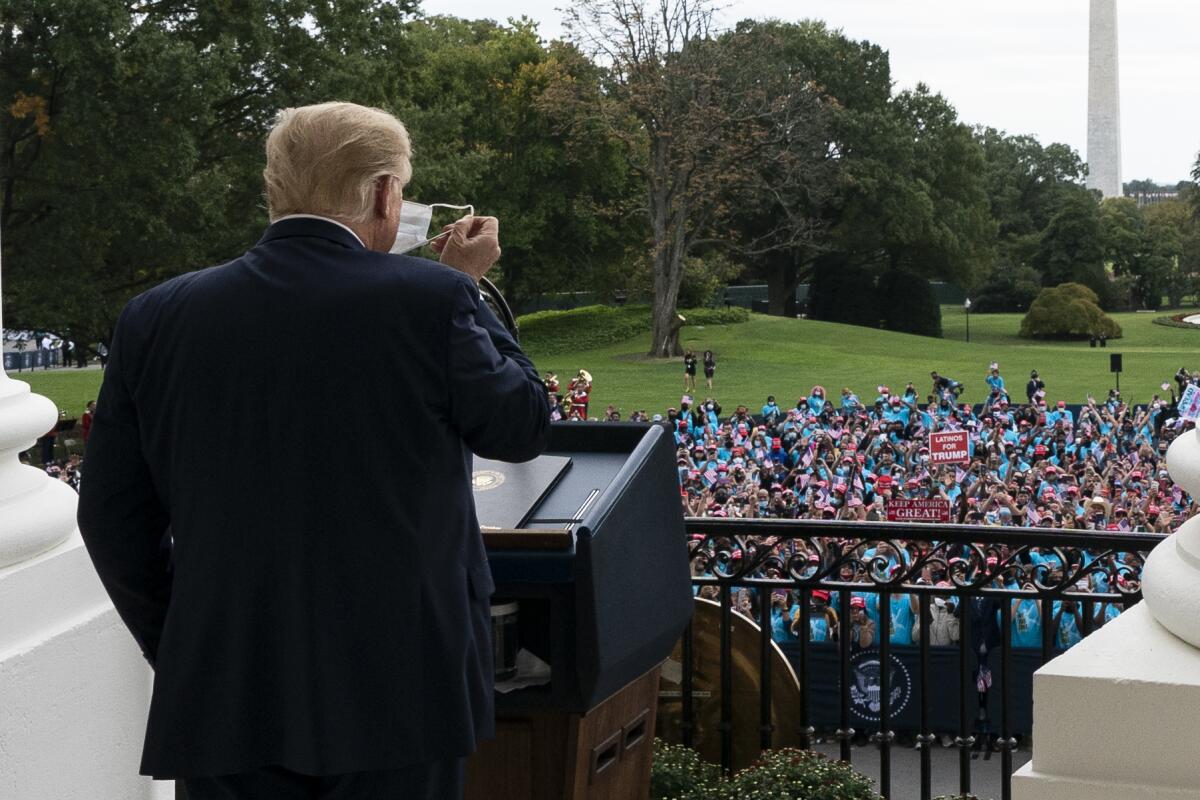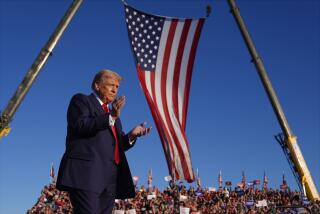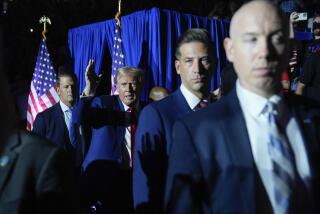Trump’s doctor says he can resume campaign rallies, but not that he’s free of coronavirus

- Share via
WASHINGTON — President Trump addressed hundreds of supporters from the White House on Saturday, his first prolonged public appearance since announcing eight days earlier he had tested positive for the coronavirus and a clear sign of his eagerness to return to the campaign trail, which his doctor later authorized him to do despite giving no indication that he had tested negative.
The Trump administration, adopting the defiant rhetoric of the president’s campaign, classified his afternoon speech from the Truman Balcony to a few hundred supporters as “a peaceful protest” on the official schedule and insisted that it was not a campaign event occurring on the grounds of the White House.
But from the very moment Trump, serenaded by the U.S. Marine Band’s rendition of “Hail to the Chief,” walked out of a draped doorway and quickly removed a light blue face mask, his focus on electoral politics was clear.
“Get out and vote!” he said. “Vote ’em into oblivion!”
Trump, who has often boasted about his long rally speeches being a sign of stamina, declared that he was “feeling great” but spoke for just 17 minutes. A photographer covering the event captured a close-up image of two small bandages on the president’s raised hand, possibly where he has been receiving intravenous injections.
Several hours after the event, White House physician Sean Conley issued a memo stating that the president “is no longer considered a transmission risk to others” and that advanced diagnostic tests taken Saturday morning showed “there is no longer evidence of actively replicating virus.”
But, the White House still has not disclosed when Trump last tested negative for the virus and Conley’s memo did not state that he has tested negative following a week of convalescence, including a three-night stay at Walter Reed National Military Medical Center, where he received experimental treatments. His brief appearance before a group of supporters appeared aimed mostly at sating the president’s desire to return to the campaign trail and set the table for a resumption of rallies Monday.
Attendees on Saturday, who wore baby blue T-shirts and red MAGA hats while standing close together on the South Lawn, were required to bring masks and were given temperature checks, but few in the crowd seemed to be wearing them as Trump spoke. Some were even sent there by Blexit, a group founded by controversial conservative activist Candace Owens, which covered travel and lodging costs for those attending a pro-law enforcement march on the National Mall before the White House event, according to a report by ABC News.
Trump’s campaign has now announced three nights of consecutive rallies, beginning with an appearance in Sanford, Fla., on Monday night, followed by events Tuesday and Wednesday night in Johnstown, Pa., and Des Moines, respectively.
“We’re starting very big with our rallies,” he said, “because we cannot allow our country to become a socialist nation.”
The president’s last rally was in Minnesota 11 days ago, the evening after delivering an angry, uncontrolled performance in the first presidential debate, an event that precipitated — along with his positive test for the coronavirus roughly a day later — another downward dip in the polls.
Democratic nominee Joe Biden, who has campaigned around the nation as Trump has been convalescing at the White House, criticized Trump’s handling of the pandemic during a rally Saturday in western Pennsylvania.
“America deserves a president who understands what people are going through,” he said in Erie. “You’re facing real challenges right now, and the last thing you need is a president who exacerbates them.”
Biden spoke to a small crowd in a parking lot marked with white circles to keep spectators sitting on folding chairs a safe distance apart.
Citing the millions of lost jobs and thousands of businesses shut down, he added: “My heart goes out to everyone struggling in this economic crisis — simple neglect on the part of this administration.”
Biden also stressed his working-class roots in Scranton and rebutted Trump’s false accusation that he plans to ban fracking, a source of many jobs in the region.
“Let me clear, no matter how many lies he tells, I am not, not, not banning fracking, period,” Biden said.
Although the president is clearly eager to resume campaigning, it’s unclear whether he has a plan to reverse the current trend lines of an election that is already underway in numerous states.
Trump will miss out on perhaps the biggest opportunity for a breakthrough that could change the course of the race — the second presidential debate. The Commission on Presidential Debates on Friday canceled the Oct. 15 showdown after Trump said he wouldn’t take part after organizers announced it would take place not in Miami but virtually, a change prompted by the president contracting the virus.
As he has in recent days in nearly 10 hours of phone interviews with friendly cable news and radio hosts, Trump’s brief remarks offered a familiar mix of triumphant boasts, rosy predictions and attacks on Biden and the mainstream media.
More than anything he said, his mere appearance in public again sought to project an image of a healthy president. Trump, who has resumed working in the Oval Office despite the risk to employees there, demonstrated the same nonchalance about the virus that has dismayed a majority of Americans.
Trump promised that a vaccine was coming “very, very soon,” and with that, the sluggish economy, with 18 million people now out of work, would rebound.
Saturday’s speech, like the Republican National Convention festivities in August, amounted to another flagrant use of the White House grounds for political purposes, which is technically a violation of federal law. And it came two weeks after Trump’s Rose Garden event that has been labeled a super-spreader for the virus. More than two dozen people linked to the White House have contracted the coronavirus since the president’s Sept. 26 event announcing Judge Amy Coney Barrett as his nominee to the Supreme Court.
Stokols reported from Washington, Finnegan from Los Angeles.
More to Read
Get the L.A. Times Politics newsletter
Deeply reported insights into legislation, politics and policy from Sacramento, Washington and beyond. In your inbox twice per week.
You may occasionally receive promotional content from the Los Angeles Times.












